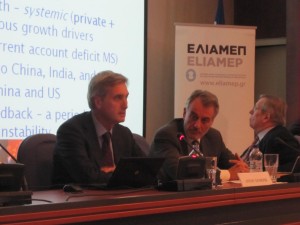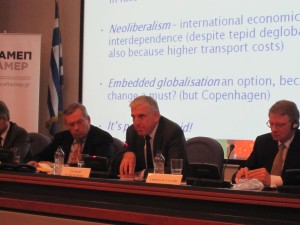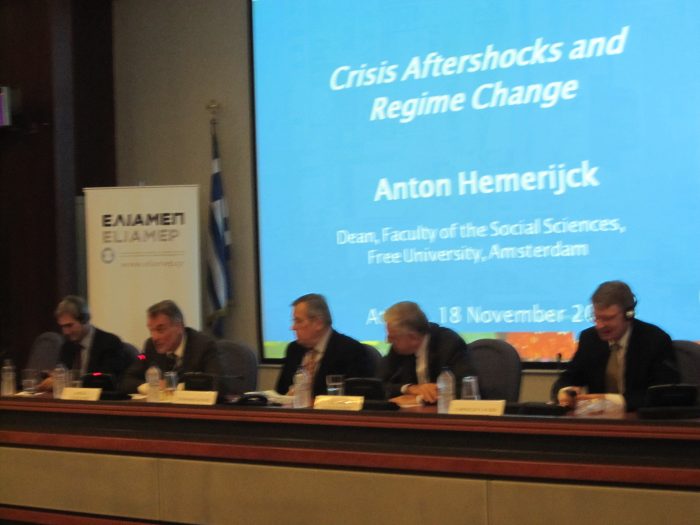 These past few days, the Irish fiscal crisis has caused tremors to the edifice of the European and Monetary Union (EMU), demonstrating that the aftershocks of the global financial and economic crisis that were felt particularly intensely in Europe only a few months ago, due to the Greek debt crisis, will keep influencing the international and European economic and political scene for some time yet. In its effort to contribute to the public debate on the exploration of institutional choices for addressing the consequences of the crisis, the Hellenic Foundation of European and Foreign Policy (ELIAMEP) organized with PAPAZISIS publications the presentation of the Greek edition of the book: “Aftershocks: Economic Crisis and Institutional Choice”, on Thursday the 18th of November, at the Amphitheatre “Y. Kranidiotis” at the Ministry of Foreign Affairs. The book was presented by Mr. Stefanos Manos (former Minister, President of the political movement DRASSI), Mr. Yannos Papantoniou (former Minister, President of the Centre for Progressive Policy Research), Professor Loukas Tsoukalis (University of Athens, President of ELIAMEP), and Professor Anton Hemmerijck (VU University of Amsterdam, former Director of the Dutch Scientific Council for Government Policy (WRR), and one of the editors of the book. HE the Ambassador of the Netherlands in Greece Mr. Cornelis van Rij made the introductory remarks.
These past few days, the Irish fiscal crisis has caused tremors to the edifice of the European and Monetary Union (EMU), demonstrating that the aftershocks of the global financial and economic crisis that were felt particularly intensely in Europe only a few months ago, due to the Greek debt crisis, will keep influencing the international and European economic and political scene for some time yet. In its effort to contribute to the public debate on the exploration of institutional choices for addressing the consequences of the crisis, the Hellenic Foundation of European and Foreign Policy (ELIAMEP) organized with PAPAZISIS publications the presentation of the Greek edition of the book: “Aftershocks: Economic Crisis and Institutional Choice”, on Thursday the 18th of November, at the Amphitheatre “Y. Kranidiotis” at the Ministry of Foreign Affairs. The book was presented by Mr. Stefanos Manos (former Minister, President of the political movement DRASSI), Mr. Yannos Papantoniou (former Minister, President of the Centre for Progressive Policy Research), Professor Loukas Tsoukalis (University of Athens, President of ELIAMEP), and Professor Anton Hemmerijck (VU University of Amsterdam, former Director of the Dutch Scientific Council for Government Policy (WRR), and one of the editors of the book. HE the Ambassador of the Netherlands in Greece Mr. Cornelis van Rij made the introductory remarks.
 All the speakers agreed that in order to ensure an orderly exit from the crisis, but also to avoid future economic crises, it is necessary to strengthen international cooperation substantially. However, the speakers differed in their preferences on the institutional form that such cooperation has to assume, while there was also concern expressed over the political constraints that will likely inhibit an international cooperation effort capable of addressing the exigencies of global economic interdependence.
All the speakers agreed that in order to ensure an orderly exit from the crisis, but also to avoid future economic crises, it is necessary to strengthen international cooperation substantially. However, the speakers differed in their preferences on the institutional form that such cooperation has to assume, while there was also concern expressed over the political constraints that will likely inhibit an international cooperation effort capable of addressing the exigencies of global economic interdependence.
More specifically, the presentation was kick-started by Professor Hemmerijck who wondered whether this crisis will prove to be an historic one, in terms of reshaping the dominant economic and political regime, in the way that has taken place in previous crises of this magnitude. Professor Hemmerijck argued that we are currently in an uncertain transitory period, but suggested that part of the solution will probably have to be the adoption of a kind of “embedded globalization”, where national public policy takes seriously into account the constraints of the global environment. Particularly for Europe, Professor Hemmerijck, argued that the institutional answer to the crisis should not rely only on fiscal adjustment measures, but should also include broader aspects of economic growth and competitiveness. This of course presupposes strengthened cooperation, which however needs to be based less on strict budgetary rules, and more on political discretion.
Focusing on the Greek crisis, Mr. Manos argued that this has less to do with the international economic crisis, and more with old structural problems of the Greek economy and the Greek political system. Mr. Manos believes that Greece should stay in the Eurozone but in order for the latter to operate effectively, a much greater degree of cooperation is needed. Unlike Professor Hemmerijck, Mr. Manos argued that such cooperation will have to be based on formal and rather strict budgetary and other rules, and on majority ruling rather the unanimity requirement that still applies to many issues.
Mr. Papantoniou attributed the crisis primarily to the commercial imbalances between surplus and deficit countries at both the international and European levels, and like the previous speakers argued in favour of strengthened international cooperation. In agreement with Mr. Manos, Mr. Papantoniou argued that international cooperation can only be strengthened through the upgrading of the institutional structures of governance. More specifically, in the case of Europe, Mr. Papantoniou believes that the reform of EMU’s governance has to include a fiscal union, the consolidation of the European financial sector, increased supranational coordination of national structural reform programs, and the establishment of a permanent rescue mechanism, endowed with substantial powers.
For his part, Professor Tsoukalis, like Professor Hemmerijck, wondered about the consequences of the crisis on the prevalent economic and political model for the coming years. Professor Tsoukalis highlighted the transitory nature of the current period and expressed his concern about future developments, given the particularly ambivalent position that we find ourselves in, caught between the realization of the limitations of free markets, and the rejection of a return to a strong version of statism. Although Professor Tsoukalis agreed with the previous speakers on the necessity of increased international cooperation, he questioned the ability of national politics to adjust to the demands of strong international interdependence.



